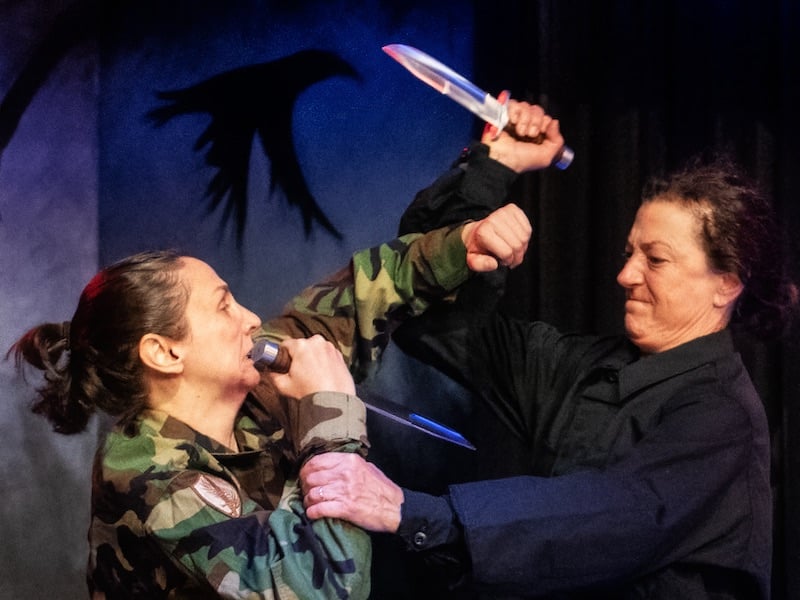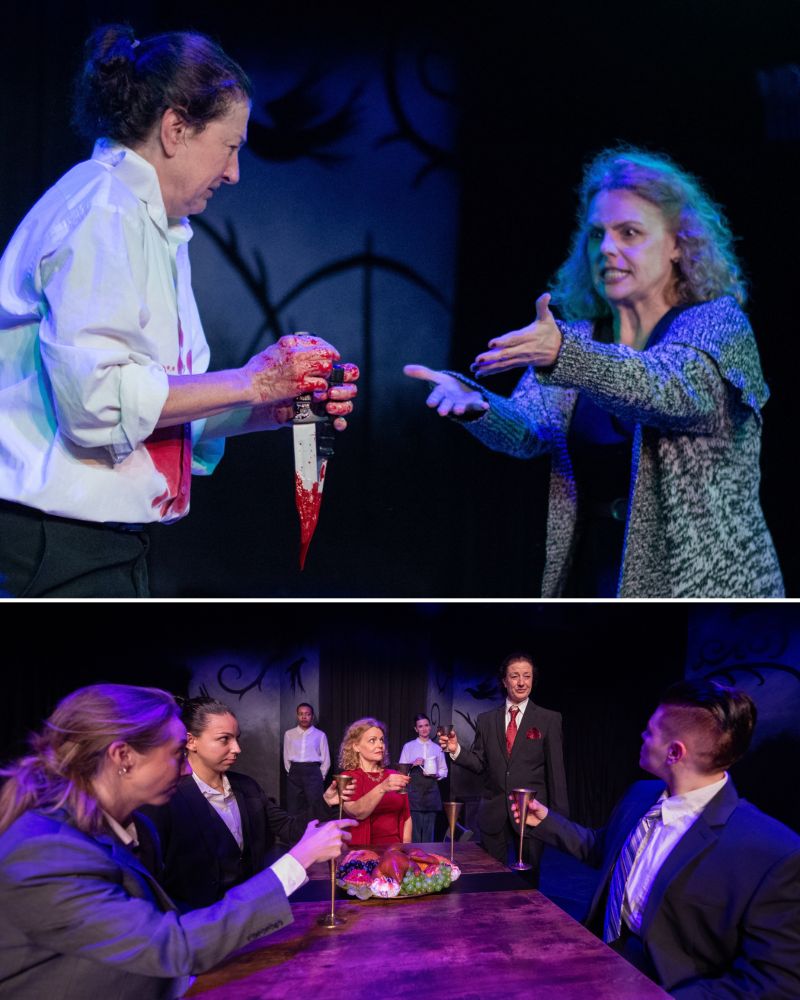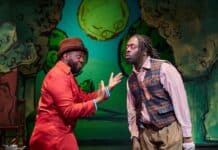The famed Scottish play leans into masculinity and male power, as do many of Shakespeare’s tragedies. In Macbeth, in particular, the Bard chose to allow his characters to underscore their manliness in such lines as “I must feel it like a man” (MacDuff); “I dare do all that may become a man” (Macbeth); “When you durst do it, then you were a man” (Lady Macbeth); “This tune goes manly” (Malcolm); “Dispute it like a man” (Malcolm); and the accusatory “Are you a man?” (Lady Macbeth). Even getting dressed is referred to as putting on “manly readiness.”
Thus, Taffety Punk Theatre Company’s all-female production — proudly touted as a Riot Grrrls creation — both underscores and overrides the hyper-masculinity embedded in this play, which was, of course, a way of life during the early 17th century, and for centuries to follow.

Taffety Punk Theatre Company boldly leans into its punk ethos and its grrrl-power collectivity in calling its artistic collaboration a band — one that produces high-quality productions for quite affordable prices. And Macbeth isn’t the company’s first foray into the classic Shakespearean oeuvre; this girl band has tackled Othello, Richard III, and Henry VI, part 2.
Comfortably ensconced in Capital Hill Arts Workshop’s cozy 7th Street SE building, the small but well-used black box theater allows the audience to fully and readily enter a world where “Fair is foul, and foul is fair.” This world toggles between the supernatural and the real worlds, in Macbeth’s mind and in the minds of his underlings and even his wife. On entering the theater, the audience walks past the three Wyrd Sisters as they spin, weave, clip, and collect a mysterious web of red ribbon. Set designer Jessica Moretti has decorated the dark walls of the theater with silhouettes of ravens and curlicues of arabesques; the remaining stage is mostly bare and moodily and mysteriously lit by Katie McCreary.
Chicago-based director Michelle Shupe allowed her 10 female players to tap into and inhabit their masculine qualities — in posture and voice, stance and gesture — rather than mimic stereotypical male physical traits. When Taffety Punk company member Lisa Bruneau’s Macbeth enters, she engulfs the spaces she breezes through, her contra-alto voice filling the theater, while her confident gestures and wide-legged stance embody a general or rising head of state. Adding militaristic luster, Elizabeth Morton’s costumes and accouterments, like cell phones, set this Macbeth in our present day with camouflage and officer’s dress blue uniforms.

Tonya Beckman’s turn as Lady Macbeth feels more ruthless than vulnerable; her pale skin and blonde hair are stark against the slash of red lipstick she dons, matching her blood-red satin sheath dress. Her power-hungry rise as the ballast egging on her at times stalwart husband soon enough devolves into her famed hallucinatory monologue regarding her blood-stained hands.
Amid all the plotting and battle plans, Macbeth and his foes follow their ambitions to conquer one another seriously. Yet director Shupe makes it a point to allow her actors to lean into the pun-filled and ironic lines throughout, giving the audience plenty of opportunities to giggle and laugh. And the beloved porter scene has, in this reimagining with Dawn Thomas-Reidy in the guise of a P.G. County security guard, become a laugh-filled standup act replete with knock-knock jokes, as ghostly knocking interrupts to no avail.
Another theme this memorable production highlights is the ghostly or hallucinatory moments featuring the trio of Wyrd Sisters — soothsayers who predict the ultimate events that lead Macbeth to fall from grace — and the other supernatural voices and apparitions that appear, discomfiting Macbeth and his entourage. As Bruneau leans into the heady life of a power-hungry king relishing his growing supremacy, even as he loses his grip on reality, blood spills, and murders occur, for, of course, no Shakespeare tragedy drops its final curtain without a stage of lifeless bodies — although the moments of murder here are offstage. Shupe shares the bloodied shirts or hands, rather than the stabbed bodies on stage.
Taffety Punk’s Riot Grrrl rendering of this evergreen morality play, which wrestles with fate, ambition, greed, and guilt, remains appropriately prescient at this divisive cultural and political moment. At the same time, the all-female cast has so authentically committed to their roles that there is nothing unnatural in having women occupy and thrive in male roles. The Punks did it before, subverting Shakespeare’s cult of masculinity. And they’ve succeeded again with Macbeth. If you can nab a ticket this weekend, to hail the king of Scotland, do it.
Running Time: Two hours with a 10-minute intermission.
The Tragedie of Macbeth plays through October 12, 2024, presented by Taffety Punk Theatre Company performing at the Capitol Hill Arts Workshop, 545 7th Street SE, Washington, DC. Remaining tickets ($10–$20) are sold out.
Macbeth
Playwright: William Shakespeare
Director: Michelle Shupe
CAST
Tonya Beckman (Lady Macbeth)
Lisa Bruneau (Macbeth)
Hana Clarice (Ross)
Fabiolla da Silva (Seyton)
Irene Hamilton (1st Wyrd Sister, Lennox)
Ashara Knyshel (2nd Wyrd Sister, Lady Macduff)
Rachael Small (3rd Wyrd Sister, Macduff’s son)
Teresa Spencer (Banquo/Macduff)
Dawn Thomas-Reidy (King Duncan, Porter, Murderer, Hecate voice)
Mallory Trice (Fleance, Malcolm)
PRODUCTION
Lighting Design: Katie McCreary
Costume Design: Elizabeth Morton
Assistant Costume Designer: Lillian Komarow
Intimacy, Fight, and Movement Director: Lorraine Ressegger-Slone
Set Design: Jessica Moretti
Sound Design: Marcus Kyd
Dramaturgy: Cam Magee
Stage Manager: Carrie Edick
Poster Art: Ryan Carroll Nelson



